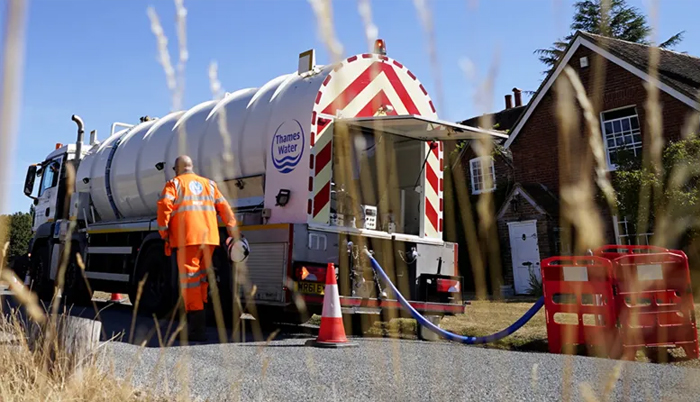![]() Home > World Business
Home > World Business
Why Is Thames Water In So Much Trouble?

![]() March 29th, 2024 | 00:32 AM |
March 29th, 2024 | 00:32 AM | ![]() 336 views
336 views
WORLD BUSINESS
Thames Water may have to be taken over by the government if it runs out of money.
But why is the UK's largest water company facing a crisis - and are other firms facing similar problems?
How did Thames Water end up with so much debt?
When the company was privatised in 1989, it had no debt. But over the years it borrowed heavily and is currently £14.7bn in debt, by one measure.
A large proportion of that was added when Macquarie, an Australian infrastructure bank, owned Thames Water, reaching over £10bn when the company was sold in 2017.
Analysts say Thames Water's current debt amounts to about 80% of the value of the business, making it the most heavily indebted of England and Wales' water companies.
Also, interest payments on more than half of Thames' debt rise with inflation, which has been high in recent years, adding to the firm's woes.
Macquarie said that it invested billions of pounds in upgrading Thames's water and sewage infrastructure while it owned the company.
But critics argue that it took billions of pounds out of the company in loans and dividends - which is a share of a business's profits that is paid to shareholders.
Thames Water said that it has not paid dividends to external shareholders since 2017.
However, dividends can also be used to move money around companies that are ultimately owned by one parent company.
Thames Water has paid over £200m in dividends to other companies within the group in the past five years.
Most of this money has then been paid as interest to outside investors who have loaned the group money.
Critics argue that the dividends were paid with money that could have been spent on improving Thames Water's infrastructure and services. However, Thames Water is legally obliged to make those debt interest payments.
Are all water companies in trouble?
Thames Water's travails have certainly put a spotlight on what is a debt-laden industry. According to the regulator Ofwat, the sector's total debt reached £60.6bn by March last year.
Of the 11 companies that provide water and sewage services in England and Wales, six are owned by or controlled by overseas investors from countries including Hong Kong, Canada and Malaysia.
Like Thames Water, critics claim that overseas owners have loaded water companies up with debt and paid themselves handsome dividends at the expense of investment.
While the sector has - like other industries - been hit by higher costs for things like chemicals and energy, one problem for water companies is that the interest that they pay on their debt is linked to the retail prices index (RPI) measure of inflation.
This is usually higher than the consumer prices index (CPI) measure of inflation. For example, in February RPI inflation was 4.5% compared with CPI inflation of 3.4%.
Ofwat estimates that half of water companies' debt is linked to inflation and the vast majority of that is tied to the RPI measure.
Meanwhile, in December 2022 Ofwat raised concerns about the financial resilience of five companies: Thames Water, Southern Water, Yorkshire Water, SES and Portsmouth.
Yorkshire, Southern, Portsmouth and SES all say they have taken steps to address Ofwat's concerns.
Who owns Thames Water?
Thames Water is owned by a group of investors spanning four continents. The largest is the Canadian pension fund, OMERS, with 31.8%.
The second-largest is the Universities Superannuation Scheme, with 19.7%, a pension fund for UK academics.
Other investors include sovereign wealth funds from China and Abu Dhabi, which invest those nations' assets on behalf of their governments.
Three other pension funds and two investment firms make up the rest.
Why was Thames Water privatised?
The entire water and waste sector was privatised 34 years ago under the late Margaret Thatcher's Conservative government for £7.6bn. At the time, Mrs Thatcher wrote off the industry's £5bn debt, leaving companies with a clean slate and gave them £1.5bn in public money.
The government had wanted to privatise the industry in 1984 but a public backlash against the plan saw it shelved until after the general election three years later. At the time, the UK was under pressure from Europe to improve the purity of its water.
However, meeting European standards would cost billions of pounds worth of investment which, it was hoped, would come from the private sector and, by extension, companies' customers.
"If we want environmental improvement, it will cost money," said Mrs Thatcher in 1988. "It will be the people who want those improvements in water who will have to pay."
Former Labour MP Ann Taylor later said of privatising the water industry: "The message is always the same - maximise the cost to the consumer to ensure maximum return to the investor. We should not be surprised at that. After all, that is what private investors expect of their companies."
Source:
courtesy of BBC NEWS
by Dearbail Jordan & Ben King
If you have any stories or news that you would like to share with the global online community, please feel free to share it with us by contacting us directly at [email protected]